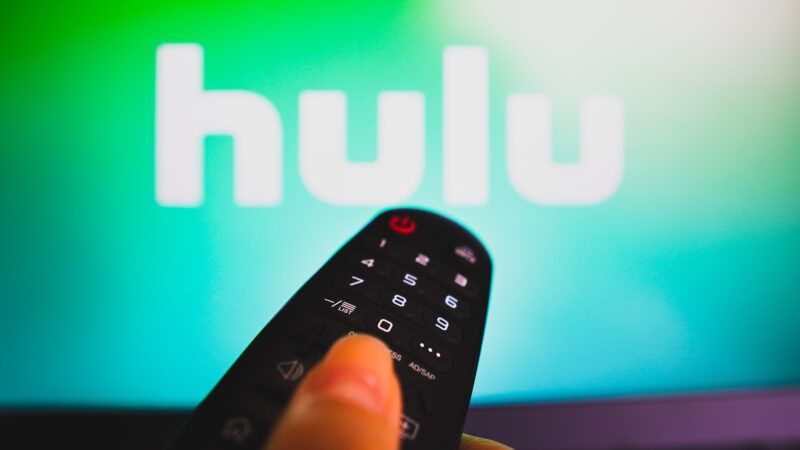After 'Censorship' Claims, Hulu Will Air Democrats' Abortion and Gun Ads
Plus: DeSantis threatens Miami restaurant over drag performances, Hawley blasts Amazon acquisition that might lower health care prices, and more…

Hulu caves to political pressure on ads. Hulu will now accept ads from Democratic groups criticizing Republican stances on abortion and guns. Previously, the Disney-owned streaming service rejected these political ads—prompting fierce outcry from groups including the Democratic Governors Association, the Democratic Congressional Campaign Committee, and the Democratic Senatorial Campaign Committee (DSCC).
The groups ridiculously accused the streaming service of "censorship" for rejecting their political ads, even though Hulu—a private company—is under no obligation to air speech about hot-button political topics. A "person familiar with Hulu's policies" told The Washington Post the company avoids ads that take any position on controversial issues.
"Their shady policies amount to outrageous political censorship," the DSCC tweeted. "Americans deserve to know the truth about these issues, and Hulu has no right to block it."
This is exactly wrong, of course. Hulu has a right to block ads from Democrats, Republicans, or any advertiser on whatever topics it chooses. Part of the beauty of the First Amendment is that it protects us from government-compelled speech, too. It's politicians who have no right to force Hulu to run particular ads.
The groups harassing Hulu over its decision are not government bodies or elected officials (rather, they're devoted to getting Democrats elected), so this stops short of being a First Amendment violation. And it's understandable that the groups didn't like Hulu's decision. It would be totally defensible for them to publicly criticize the company, encourage supporters to do the same, or encourage a boycott.
But where things cross the line is their attempt to mislead people into thinking that Hulu "has no right to block" Democrats' political ads.
Aren't Democrats the ones always crowing about how more must be done to stop misinformation on social media? And yet here are some of their biggest groups spreading misinformation in a self-serving manner and encouraging followers to retweet it.
This may have led to a short-term win for them, with Disney announcing that "Hulu will now accept candidate and issue advertisements covering a wide spectrum of policy positions." But it's bad news for free speech and liberal, democratic values more broadly.
Throughout the Trump era and continuing today, Republicans have insisted that search engines, social media companies, and other digital entities must platform their candidates, causes, and pundits, frequently condemning and threatening those that reject conservative content. Throughout this, Democrats often pointed out that these private companies are well within their rights to block user content, ads, and accounts as they see fit.
Democrats rejecting that wisdom just so they can get some midterm ads against Republicans on Hulu seems like a strategy bound to backfire. But alas, neither Democrats nor Republicans seem to have any principles in this realm beyond "digital companies should platform the content we like and not the content we don't like…"
FREE MINDS
Florida Gov. Ron DeSantis is going after the Miami bar and restaurant R House for allowing minors to eat at the restaurant during drag performances. DeSantis and the Florida Department of Business and Professional Regulation have filed a complaint against the restaurant, accusing it of disorderly conduct that is "manifestly injurious to the morals or manners of the people." The complaint cites a 1947 Florida Supreme Court ruling saying that "men impersonating women" in "suggestive and indecent" ways was a public nuisance. The state is now seeking to have R House's liquor license revoked, DeSantis said at a press conference.
The state's complaint, obtained by NBC News, goes on to state that a video shared by the Twitter account Libs of TikTok "shows what appears to be a transgender dancer leading a young girl by the hand and walking through Respondent's dining area….The dancer's buttocks were fully exposed, and his 'g-string'-style bikini bottom was stuffed with dollar bills — a practice that is commonly known to occur at strip clubs. The dancer's breasts — unmistakably female in appearance — were also fully exposed except for the nipple and areola, which were covered with adhesive 'pasties.'"
"We are an inclusive establishment and welcome all people to visit our restaurant," said R House in a statement. "We are hopeful that Governor DeSantis, a vociferous supporter and champion of Florida's hospitality industry and small businesses, will see this as what it is, a misunderstanding, and that the matter will be resolved positively and promptly."
FREE MARKETS
This is why we can't have nice things:
https://twitter.com/PatHedger18/status/1552746861836083200
You can find the full letter here.
QUICK HITS
• Most Americans think we're in a recession.
• "The big question is not whether the U.S. is in a recession. It's whether the economy will soon worsen," writes David Leonhardt at The New York Times.
• The RAP Act would restrict the use of musical lyrics and "artistic expression" as criminal evidence.
• After Dobbs, Democrats and Republicans are switching places on Section 230.
• The Sarbanes-Oxley Act has now been "holding America back" for two decades, write John Berlau and Josh Rutzick in The Wall Street Journal.
• The "the antitrust duel of the summer" doesn't involve tech companies, but a much more traditional industry.
• The family of a boy murdered over a water-gun fight is trying to hold TikTok responsible, since water-gun shooting videos have been popular on the app.
• The American Data Privacy and Protection Act "mimics some of the worst flaws found in the European Union's General Data Protection Regulation (GDPR), while creating new problems that the GDPR had avoided."
• "Home distilling, unlike home brewing and winemaking, is still prohibited by federal law," points out Reason's Jacob Sullum.
• "55% of America's top startups were founded by immigrants," so why won't Congress let more of them in?
